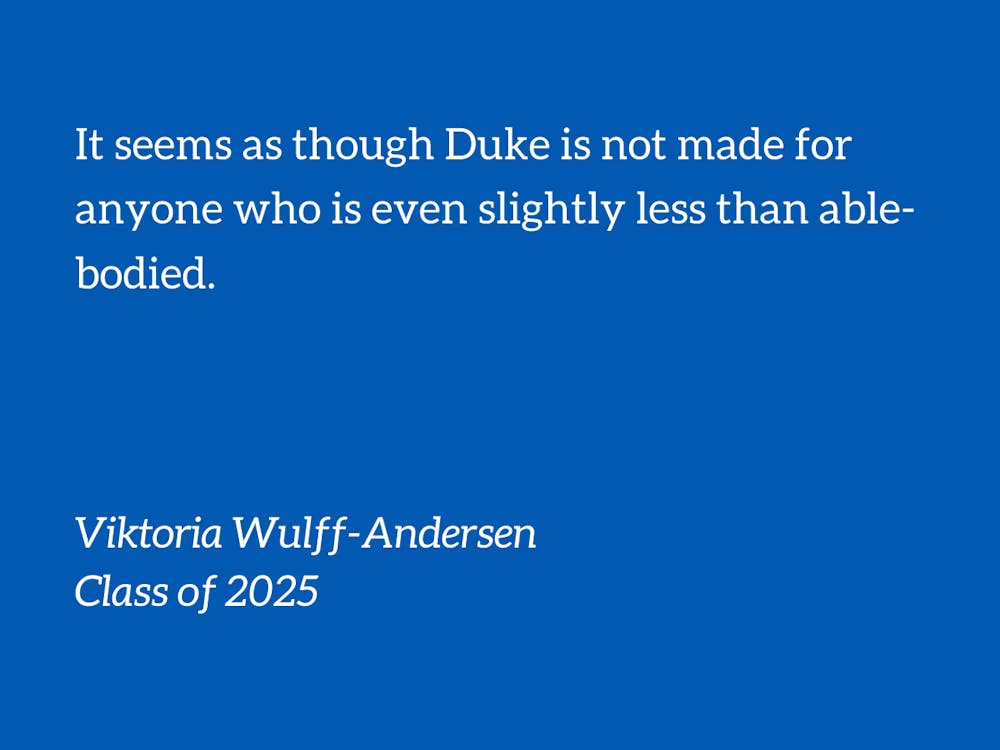I know it’s going to be a bad day when I’m too weak to open the doors at WU without the assistance of an activation switch.
In many ways, this metric reminds me of “The Spoon Theory”—the idea widely adopted by people with a chronic illness that individuals have different amounts of “spoons” (units of energy) to use for daily activities, meaning those with less spoons are unable to afford as many activities as the average person. However, rather than measure my energy against the overall population, I measure my energy against Duke students who are able to open the doors at WU with ease, who are able to exist in Durham without the myriad of health conditions that plague me. While I’m certainly privileged enough to be considered able-bodied in many aspects, I still suffer from frequent fatigue, a weak heart, orthostatic hypertension, IBS and common tremors because of past malnutrition.
Thus, I’m left to reconcile with the fact that I’m too tired for Duke University. I’m a fish out of water in a campus full of students on an energy-demanding grind.
Ironically enough, I made this discovery whilst attending class near the koi pond in Duke Gardens. Two hours prior, I was notified of the location shift from the Old Chemistry building and was immediately left scrambling to weigh my options. I had a group presentation that day and was keenly aware of my participation grade. Yet, it was a day worse than failing to pull open WU’s doors—it was a day where I was cognizant of every step I took, of every shaking limb and of every panting breath. It was a day where I felt like I was about to collapse on the spot, and when I finally embarked on the trek to Duke Gardens and stood next to my boisterous peers, only to have to sit down because I couldn’t stomach standing anymore, it was a day where I finally became aware that I didn’t possess the energy required to be a Blue Devil.
Everything then clicked into place. The nights I collapsed into bed at 7 pm, only to wake up to Snapchat stories of the rest of the freshman class dancing at Shooters until 2 am. The times when I bailed on my friends who wanted to walk from West to East Campus because the C1 was more accessible to my energy levels. The days where I was forced to evaluate the shortest route to navigate campus. The gym sessions I never attended. The club meetings I canceled on. Every aspect of my Duke experience seemed to be me falling short of what is culturally demanded of me.
It seems as though Duke is not made for anyone who is even slightly less than able-bodied. Handicap accessibility is far from perfect, with many buildings lacking ramps, automatic doors and other necessary accommodations. Further, students with learning impairments and disabilities often aren’t made aware of what the SDAO and the Academic Advising Office can offer, and the Duke Disability Cultural Center is so hidden away in the Bryan Center that only 19.21% of the Class of 2025 are even aware of it. If even I—a student without severe illnesses or disabilities—struggle to live at Duke, how are people with more severe conditions managing?
Everyone—regardless of ability status—is worthy of a Duke education and the chance to experience its “work hard, play hard” culture. Accessibility and awareness need to be improved so that that vision can become a reality. Whether through the inclusion of a Disability Studies major, increased marketing for student accommodations or discussions about disability and injury in classrooms, the Duke experience needs to diversify itself so that students like me can profit from it in ways that are accommodating to our needs. Otherwise, there’s going to be an entire sect of students left behind because they were too tired to attend Duke.
Viktoria Wulff-Andersen is a Trinity first-year. Her column runs on alternate Mondays.
Get The Chronicle straight to your inbox
Sign up for our weekly newsletter. Cancel at any time.
Viktoria Wulff-Andersen is a Trinity junior and the opinion editor of The Chronicle's 119th volume.

